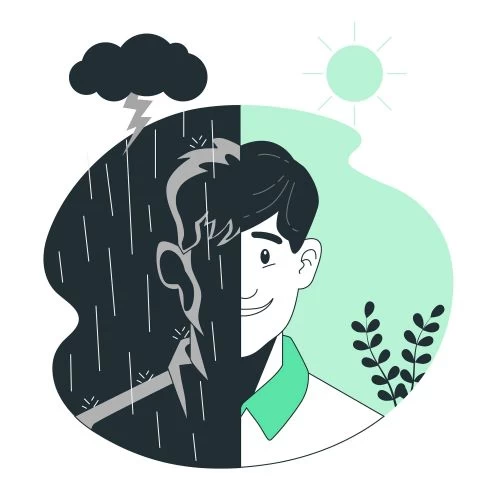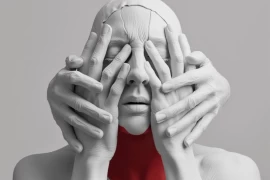
Bipolar Disorder
- Bipolar Disorder
- What is Bipolar Disorder?
- How does Bipolar Disorder Progress?
- How is Bipolar Disorder Treated?
- How can Bipolar Disorder be Detected?
What is Bipolar Disorder?
The term bipolar in our language means 'two poles'. Bipolar Disorder also means 'disorder with two poles'. One of these poles is 'Mania', characterized by an elevated mood, while the other pole is 'Depression', characterized by a low mood. Therefore, Bipolar Disorder was previously referred to as 'Manic-Depressive Illness'. Bipolar Disorder is a psychiatric disorder characterized by periods of mania and depression. These two phases alternate with periods of stability, during which the individual typically returns to normal. However, some residual symptoms that partially affect daily life may persist in some patients.
How does Bipolar Disorder Progress?
Mania (the manic phase) is a period when the individual experiences excessive euphoria. Symptoms during this phase include decreased need for sleep, unrealistic projects, feeling overly important, rapid speech, racing thoughts, feeling excessively energetic, excessive spending, and reckless driving.
Depression (the depressive phase) is characterized by feelings of hopelessness, pessimism, decreased self-confidence, feelings of worthlessness, guilt, inability to enjoy previously pleasurable activities, changes in appetite or sleep patterns, and thoughts of death or suicide.
One of the significant characteristics of the course of bipolar disorder is its seasonal pattern. Patients may experience mania in spring and summer, and depression in autumn and winter.
Untreated manic episodes can last for several months. Untreated depression can continue for up to 6 months. In the early years of the illness, the periods between episodes tend to be longer, but over time, these intervals typically shorten.

How is Bipolar Disorder Treated?
In the treatment of bipolar disorder, medications such as lithium, valproate, carbamazepine (antiepileptics), and antipsychotics play a crucial role. In addition to medication, treatment programs include stabilizing lifestyle, avoiding poor nutrition, alcohol, and substance use, developing positive thinking and coping skills, learning strategies to manage stress, and acquiring detailed knowledge about the course of the illness.
In the treatment of bipolar disorder, in addition to treating episodes, preventive treatment to prevent attacks should also be planned. Measures that patients should pay attention to in their daily lives include maintaining a regular sleep schedule, avoiding alcohol and substances, maintaining a balanced diet, and regular exercise.
How can Bipolar Disorder be Detected?
Moreover, recognizing the warning signs of the illness increases the chances of early intervention and improves response to treatment. Therefore, it is important to inform patients and their families about these warning signs. Especially during seasonal transitions, paying attention to these signs is crucial.
Warning signs include decreased need for sleep despite feeling rested, increased talkativeness compared to usual, easily getting excited, increased spending behavior, and changes in weight and appetite. When warning signs are identified, it is important to quickly reach out to family members and doctors. Waiting for the illness to escalate can make it very difficult to control.

Sp. Dr. Tuba Öğer
Specialist in Psychiatry





